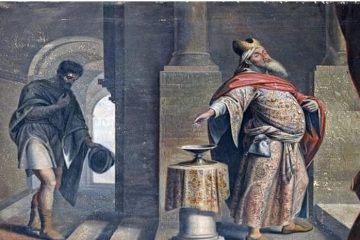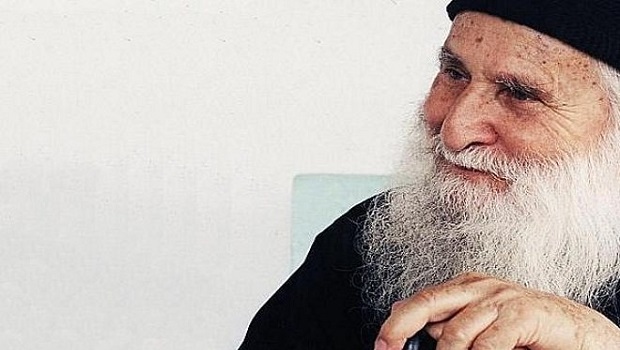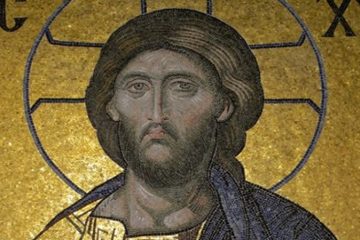Alexandros Christodoulou
Saint Silouan the Athonite (24 September)
Saint Siouan- Symeon Ivanovich Antonov, before his tonsure- was born in 1866 into a peasant family in the Tambov region of Russia. From the age of four he began wondering: ‘Where is this God? When I grow up, I’ll travel the whole world looking for Him’. When he was a little bit older he heard about the life of a holy recluse and the miracles that happened at his grave and thought: ‘If he’s a saint, that means God’s with us already, so there’s no need to go wandering the world to find Him’. At this thought his heart became inflamed with love of God.
His mind focused on the continuous recollection of God and he prayed fervently and with tears. He noticed an internal change because of this state of Grace and this lasted for three months, during which he felt the desire to become a monk. Thereafter, this Grace left him and he returned to a worldly life. One day, in a brawl, he almost killed a fellow-villager. Soon after this episode, after he’d fallen asleep, he dreamt about a snake slithering into his mouth. At the same time as the nausea he felt at this, he heard the voice of the Mother of God telling him with extraordinary sweetness: ‘You swallowed a snake in your dream and you didn’t like it. Well, I don’t like what I see of your actions’.
He then felt deep revulsion over his sin and, overcome with fervent repentance he thought continuously of the Holy Mountain and the judgment to come. In 1892, as soon as he’d finished his military service, having asked Saint John Kronstadtskij to pray ‘that the world wouldn’t hold him back’, he set off for the Bower of Our Lady, the Holy Mountain where he entered the Russian monastery of Saint Panteleïmon as a novice. After the general confession he made at the beginning of his new life, his spiritual father told him that all his sins were forgiven and the young novice was overjoyed. Then he began to be troubled by carnal thoughts. His spiritual father advised him to have nothing to do with bad thoughts, but to reject them immediately by invoking the name of Jesus. From then on the blessed servant of God, in the forty-five years of his monastic life never once gave in to any inappropriate thoughts. With burning, ceaseless prayer he began to ask God to have mercy on him: during the day which he spent at the mill doing heavy and exhausting work, an obedience which he carried out with meticulous care; but particularly at night, almost the whole of which he spent in fervent prayer, either standing or sitting on a stool. In total he’d sleep no more than two hours, and even then his rest would be broken.
Three weeks after his arrival at the monastery, one evening, as he was praying before an icon of the Mother of God, the Jesus Prayer entered his heart and began to work by itself, unceasingly, day and night. This rare and great gift was followed by a fierce struggle against thoughts of pride and of despair over his salvation, to which he was subjected by the demons. One night, while he was praying in his cell, he was suddenly filled with an unusual light which passed right through his body. His soul was in turmoil. Even though the prayer continued to work within him it had lost its contrition and the novice realized that this was a case of Satanic delusion.
He fought against these demonic attacks for six months praying as hard as he could, wherever he found himself, and he plumbed the depths of despair. Sitting in his cell, he thought: ‘God’s unremitting’. He felt completely abandoned and for about an hour his soul was enveloped in the darkness of indescribable dread. At the hour of Vespers, while he was saying the Jesus prayer and gazing at the icon of Christ on the iconostas in the chapel at the mill, he was suddenly illumined by a supernatural light- joyful and sweet this time – and saw the living Christ, gazing back at him with ineffable gentleness. Divine love spread through the whole of his existence and caught up his spirit in the contemplation of God. For the next forty-five years of his monastic life, he constantly confessed that, through the Holy Spirit, he had known Christ Himself, Who had appeared to him and had revealed His Grace in all its fullness. The vision altered his soul, to the extent that his insatiable spirit, focused night and day on his beloved Lord, cried: ‘My soul thirsts for the Lord and I seek Him with tears. How can I not seek You? You sought me first and gave me a taste of the sweetness of the Holy Spirit. And my soul loved You completely’.
Simeon concentrated all his powers on the struggle for pure prayer, and on battling with demonic thoughts of pride. Occasionally he was comforted by brief visitations of Grace, but when this left him and he was faced with the demons, the pain in his soul was indescribable. In order to keep Grace within him all the time, without withdrawing, he began a long and exceptionally painful struggle, which often exceeded normal human powers.
In 1896, he was tonsured a monk of the Lesser Habit and given the name Silouan. Fifteen years of harsh struggle followed the day when the Lord had appeared to him, and one night, as he rose from his stool to do prostrations, a demon appeared before the icon of Christ, expecting Silouan to prostrate himself before him. With pain in his heart, Silouan sought the assistance of the Lord and in his soul heard the answer: ‘Proud people always suffer thus from the demons. ‘Lord’, said Silouan, ‘teach me what I should do to humble my soul’. And he received the answer: ‘Keep your mind in hell and don’t despair’.
In this way, God revealed to him that the aim of every ascetic effort is the acquisition of the humility of Christ, which leads to pure prayer and a passionless state. He used to say that as soon as his mind strayed from the recollection of the fire of hell, his bad thoughts once again gained ground.
Another fifteen years were spent in intense struggle, until he gained complete control over every movement of his heart. And so he entered the last fifteen years of his life on earth in a state of complete freedom from the passions.
In 1911, he was tonsured a monk of the Great Habit. At about this time, in order to avoid distraction from his constant prayer, he asked a blessing from the abbot to be released from the obedience of steward and to withdraw to the Old Russian monastery, where strict ascetics lived because of the quietude of the location. Here he was afflicted with Bell’s palsy and until his death suffered from terrible headaches, which he considered to be a corrective punishment for following his own will.
A year and a half later, the monastery recalled him to the obedience of steward, which he continued to perform until his death. Once he returned to his obedience, his prayer became more fervent than it had been at the Old Russian monastery. Every day he’d do the rounds of the workshops to assign the tasks for the day and then would return to his cell, where he’d pray with tears for the workers and their families, ‘for God’s people’. Having received from the Holy Spirit the Grace of actively experiencing Christ’s love for the world, he would pray all the time, with burning tears, for the whole of humankind, particularly the departed. He used to say: ‘Praying for people means shedding blood’. And he taught that the criterion for true faith is love for your enemies.
Supporting the world with his prayers and entreating the Lord that, through the Holy Spirit, all the peoples on earth would come to know Him, he finished his earthly course on 24 September, 1938. On 26 November 1987, he was canonized by the Orthodox Church.
Source: pemptousia.com




0 Comments